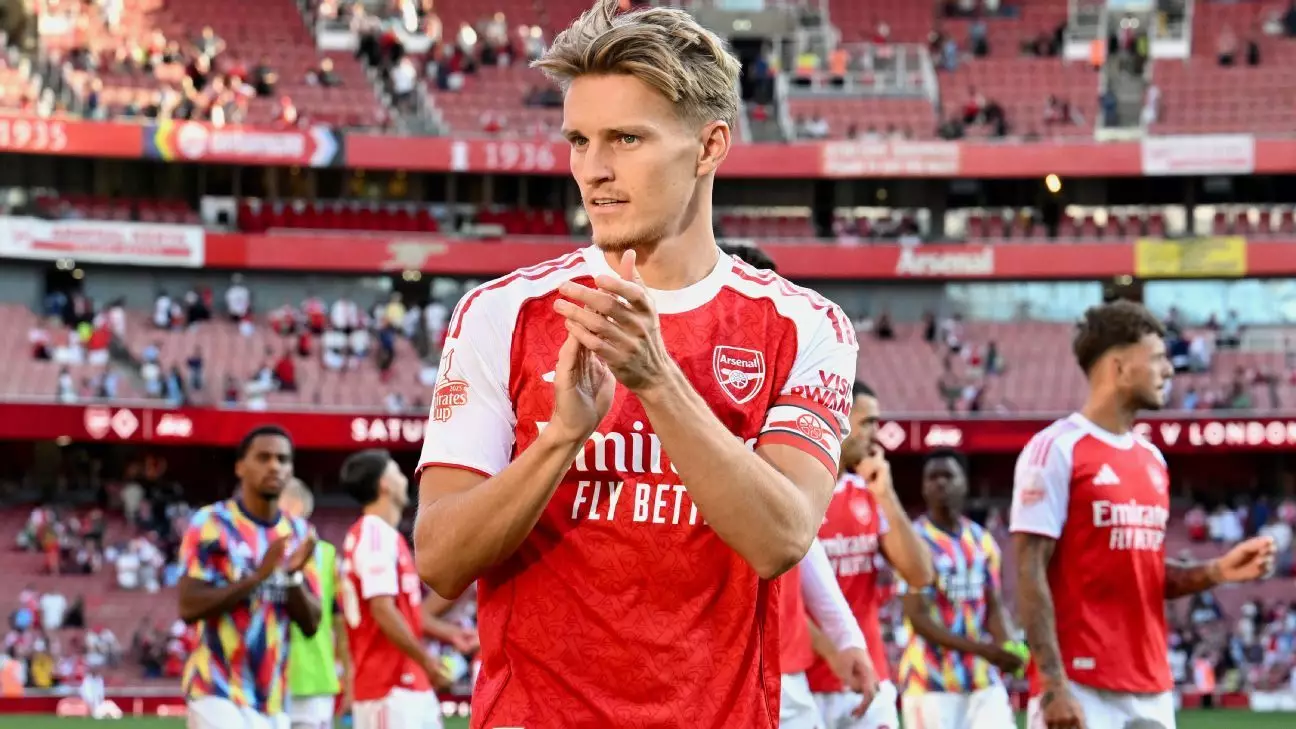The recent controversy surrounding Mikel Arteta’s decision to retain Martin Ødegaard as Arsenal’s captain underscores a fundamental debate within football clubs: who truly embodies leadership? Tony Adams, a legendary figure in Arsenal’s history, voiced skepticism about Ødegaard’s ability to steer Arsenal to Premier League glory, suggesting instead that Declan Rice should wear the armband. Adams’ remarks stem from a long-standing football philosophy that emphasizes physical presence, vocal authority, and tangible leadership qualities — attributes he perceives Rice to possess more than the Norwegian playmaker. Yet, Arteta’s unwavering support for Ødegaard reveals a deeper understanding of leadership that transcends mere verbal authority and physical intimidation.
Rather than succumb to the traditional notion of vocal, commanding captains, Arteta’s approach highlights the importance of peer respect and the collective voting process. By allowing players to choose their leader, the manager prioritizes unity and comfort within the squad. This dynamic challenges the conventional hierarchy and pushes us to reconsider what qualities are truly necessary for captaincy success. The fact that the squad overwhelmingly backed Ødegaard indicates a shift towards valuing leadership that emanates from consistency, professionalism, and the respect of teammates — qualities that might be less obvious but equally influential on the pitch.
Trust in Player Consensus: A Progressive Leadership Model
Recognizing the players’ choice as a strong indicator of effective leadership is a progressive stance that aligns with modern team dynamics. It signals a move away from dictatorship in favor of democracy within the squadroom, where players’ perspectives ultimately shape team structure. This approach fosters a sense of ownership and collective responsibility, empowering players to feel valued beyond their technical abilities.
However, this process invites critical examination. Does player voting always lead to optimal leadership? While unity is vital, there’s a risk of complacency or popularity contests overriding the need for a captain with strategic vision or commanding authority. Yet, in Arsenal’s case, the clear and decisive vote suggests that Ødegaard’s leadership style resonates well with the team, possibly because he leads by example both on and off the pitch. His ability to adapt and communicate effectively could arguably be more impactful than traditional, outspoken captains.
Ultimately, Arteta’s choice highlights a nuanced understanding: leadership is not solely about loud voices or intimidating stature, but about earning trust and motivating through consistent performance and understanding. His stance reflects confidence in his squad’s wisdom, a move that may set a precedent for other clubs to rethink their leadership selection methods.
Handling Disputes and Upholding Discipline amid Rule Changes
In addition to leadership tensions, Arteta’s comments reveal an acute awareness of the evolving landscape of football regulations—particularly regarding disciplinary measures for timewasting and unsportsmanlike conduct. Last season’s crackdown on petty infractions like kicking the ball away or holding players at corners exposed vulnerabilities not just in Arsenal but across the Premier League. The initial leniency gave way to heightened scrutiny, with players like Declan Rice and Leandro Trossard falling afoul of the new enforcement, leading to dismissals and negative impacts on team morale.
Arteta’s optimistic outlook regarding this season’s rule application underscores the belief that consistency will ultimately foster a more disciplined and competitive environment. His acknowledgment of preseason meetings with referees and officials indicates a proactive approach in aligning team conduct with regulatory expectations. The intent is to avoid last season’s erratic disciplinary swings and instead promote a culture of professionalism that can adapt to rule changes smoothly.
Yet, this raises broader questions about the effectiveness of refereeing consistency. Football’s continuous evolution in officiating standards often results in on-field chaos, with players unsure of what behaviors will be penalized. Arteta’s confidence suggests trust in the refereeing system, but such trust must be matched by clear communication and fair enforcement. For Arsenal, honing discipline and patience will be crucial in navigating a season where technicalities can decide outcomes as much as skill and strategy.
From Leadership to Discipline: A Vision for Success
At its core, the discussion about Ødegaard’s captaincy and the league’s disciplinary policies reflects a broader desire within Arsenal—a club striving for stability and excellence amidst ongoing change. The decision to stick with a player trusted and supported by his teammates demonstrates a faith in the collective over individual authority, an approach that could redefine modern leadership in football.
Simultaneously, the emphasis on disciplined gameplay and rule adherence highlights a strategic effort to refine Arsenal’s professionalism. While talent undoubtedly remains the backbone of success, onboarding a culture of responsibility and mutual respect complements technical prowess. Arteta’s leadership appears to be rooted in these ideals: trusting his squad’s judgment, fostering a united front, and maintaining high standards of conduct. It’s a holistic vision that believes sustainable success arises from internal cohesion, respecting diverse qualities, and ensuring consistency both on and off the pitch.
In a sport often driven by individual heroics and outspoken captains, Arsenal’s emphasis on collective decision-making and discipline signals a paradigm shift—one that values the quiet strength of purposeful, cohesive leadership and the importance of adhering to evolving norms. Whether this approach leads to Premier League supremacy remains to be seen, but it undeniably challenges the established patterns of villa leadership, urging clubs everywhere to reevaluate what truly makes a successful leader in modern football.

